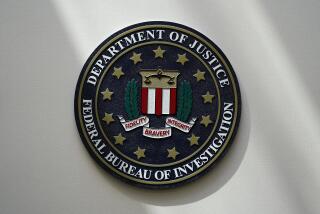Bloch Was in Position to Recruit Spies, Ex-U.S. Aide Says
- Share via
WASHINGTON — As the second in command at the American Embassy in Vienna, suspected spy Felix S. Bloch was in a good position to help the Soviet Union recruit other American officials to take part in espionage, a former high-level U.S. intelligence official said Sunday.
Top government officials are trying to assess the damage to U.S. security of Bloch’s possible cooperation with the Soviet Union, and there are strong suspicions that his alleged actions might have been taken as part of a network of KGB informants.
Bloch, 54, was suspended from his State Department post in June after he allegedly was observed handing a briefcase to a KGB agent in Paris. U.S. officials have confirmed that Bloch is under investigation for possible espionage, but he has not been charged with any offense.
At the time he was placed on leave, Bloch was working as director of the State Department’s Office of Regional Political Economic Affairs in Washington. But his previous posting from 1980 to 1987 had been as chief deputy to the U.S. ambassador in Austria.
Kenneth deGraffenreid, former senior director of intelligence programs for the National Security Council, said that investigators are certain to be exploring the possibility that Bloch not only passed along government secrets to the Soviets but that he also helped the KGB recruit other Americans as spies while he was in Vienna.
“The Bloch case itself is consuming a lot of time because of the potential that he could have given information which would have allowed recruitments,” deGraffenreid said on ABC’s “This Week with David Brinkley.”
“A man who’s No. 1 or 2 in the embassy would know all the foibles--who’s disgruntled, whose wife is unhappy, the kind of little things that intelligence services look for when they go to recruit an American,” deGraffenreid said.
“An intelligence service would pay a fortune just for that kind of information,” he said, “let alone the kind of specific negotiating positions, the feedback, that he could give them about . . . how the American government is reacting to Soviet moves.”
According to published reports, U.S. intelligence picked up through electronic surveillance a conversation in which Bloch was warned by his KGB handler that there was a “virus” spreading that might have “infected” him. The word “virus” was understood to be code for an FBI investigation.
Joseph E. DiGenova, a former U.S. attorney, told ABC that the warning Bloch allegedly received suggests either that U.S. surveillance had been “too overt,” even before the matter became public knowledge, or that other U.S. officials might have been involved in passing data to the Soviets.
At present, Bloch is being tailed by a large contingent of FBI agents, Soviet Embassy representatives and American news reporters when he appears in public. The highly visible FBI surveillance is seen by government officials as a necessary step to prevent Bloch from possibly defecting while the investigation continues.
DiGenova said that government investigators are in a difficult position because Bloch apparently did not divulge much information when he was interviewed by State Department and FBI officials on June 22.
“And now that leaves the government with the option of figuring out how to prosecute him, if at all, and if not, at least to use information from him--and how you get that is the next step,” DiGenova said.
Asked what a defense lawyer might do in representing Bloch should he be charged, DiGenova replied that he would suggest that the government grant Bloch immunity from prosecution in exchange for his assistance in assessing the damage caused to U.S. national security by his activities. He noted that Bloch then could be imprisoned for contempt of court if he failed to cooperate.
While Bloch probably would go unpunished, he said, immunity would accomplish a valuable purpose. “The damage assessment is extremely important,” he said.
More to Read
Sign up for Essential California
The most important California stories and recommendations in your inbox every morning.
You may occasionally receive promotional content from the Los Angeles Times.













